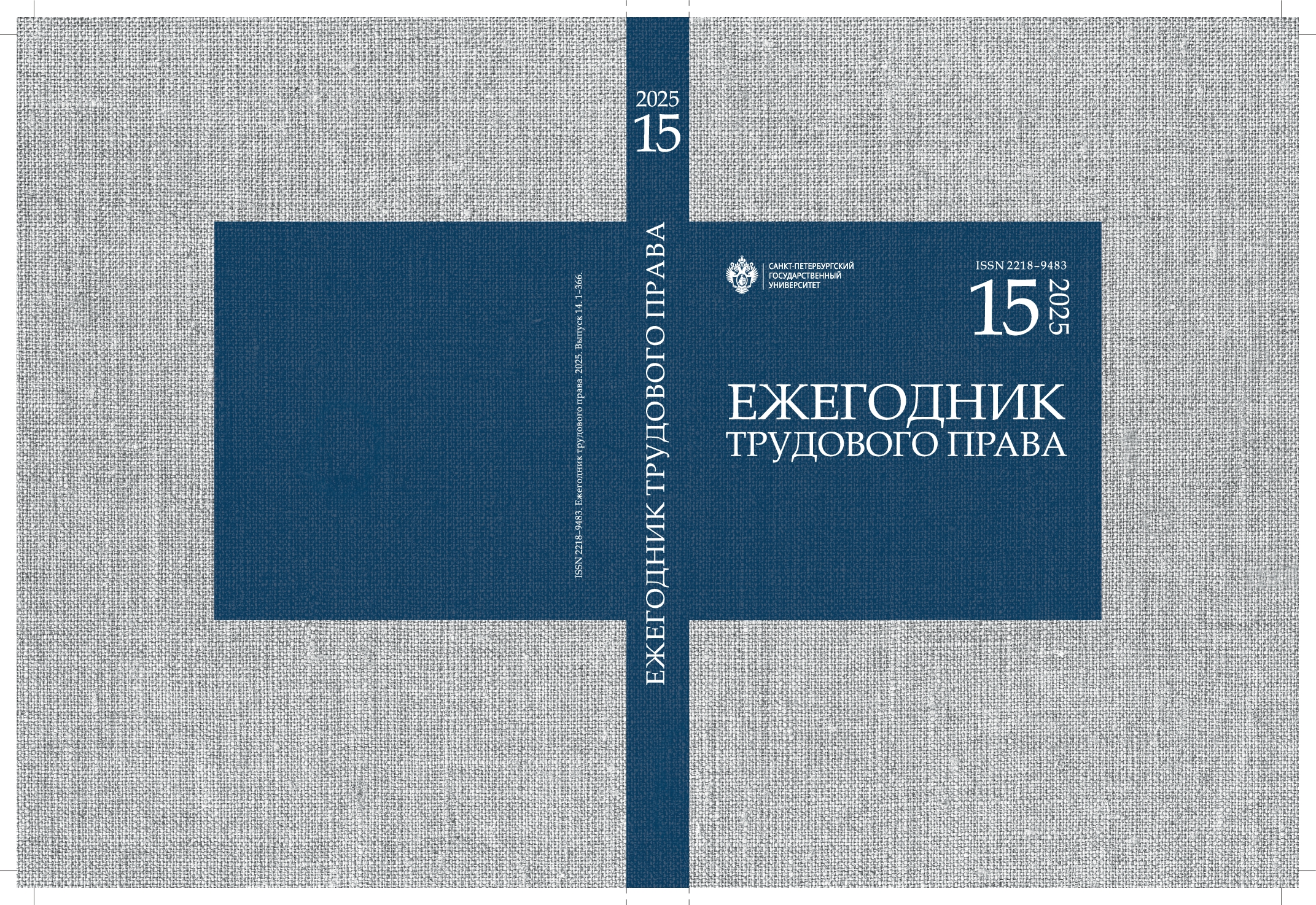Об оценочной функции индивидуального договорного регулирования трудовых отношений (на примере работников, соблюдающих религиозные нормы)
DOI:
https://doi.org/10.21638/spbu32.2025.113Аннотация
Расширение масштабов использования дистанционной работы, взрывной рост цифровых технологий и алгоритмов искусственного интеллекта актуализировали проблемы определения природы правоотношений по найму труда и пределов индивидуального договорного регулирования трудовых отношений. Авторы обращаются к функциональному анализу индивидуального договорного регулирования трудовых правоотношений, рассматривая понятие функций права, разновидностей функций индивидуального договорного регулирования трудовых отношений. Для анализа выбрана реализация оценочной функции индивидуального договорного регулирования через призму трудовых отношений с особой категорией работников – работниками, соблюдающими религиозные нормы. Отправной точкой в статье является тезис о том, что изменения в условиях и в содержании труда предусматривают активизацию человеческого ресурса, при которой естественная неравноценность работников, их личностные качества существенно влияют на качество и динамику самого трудового отношения, механизм его правового регулирования. Поэтому к требованию о равенстве возможностей индивидов присоединяется идея о справедливости внимания к различиям, с помощью которых личность себя идентифицирует. Анализ доктрины не позволил теоретически строго разграничить функции права и функции правового регулирования. К функциям индивидуального договорного регулирования трудовых отношений авторы отнесли нормирующую и оценочную функции. Оценочная функция связана с психологическим восприятием субъектами правоотношения правовой информации, получаемой ими в процессе индивидуального регулирования, предполагает выражение правовой самоидентификации субъектов трудового права. В рамках оценочной функции индивидуального договорного регулирования трудовых отношений авторы выделили информационную и воспитательную подфункции. Сложный вопрос о регламентации формы выражения воли субъектами такого регулирования рассмотрен авторами в контексте информационной подфункции на примере разных сценариев переговоров работника, соблюдающего религиозные нормы. Кроме того, в информационном плане представляется важным уяснение субъектами индивидуального договорного регулирования возможностей изменения трудового правоотношения для обеспечения его мобильности и гибкости, что диктуется условиями рыночной экономики. Что касается воспитательной подфункции, то она формирует отношение субъекта к окружающему миру, к протекающим в нем процессам, проявляясь в восприятии лицом правовых установок и в получении участниками общественного процесса труда опыта по созданию определенного трудового правопорядка в сфере труда.
Ключевые слова:
трудовой договор, функции права, правовое регулирование труда, индивидуализация, условия труда, договорное регулирование, религиозный работник
Скачивания
Библиографические ссылки
Безина, Александра К., Бикеев, Асхат А., Сафина, Диляра А. 1984. Индивидуально-договорное регулирование труда рабочих и служащих. Казань: Издательство Казанского университета.
Дивеева, Нелли И. 2008. Теоретические проблемы индивидуального правового регулирования трудовых отношений. Диссертация ... доктора юридических наук: 12.00.05. СПб.
Дивеева, Нелли И. 2008. "Функции индивидуального правового регулирования трудовых отношений". Вестник Томского государственного университета 3: С. 123-126.
Маркова, Елена Н. 2012. "Религиозные нерабочие праздники в светском государстве". Конституционное и муниципальное право 3: С. 19-24.
Реутов, Валерий П. 1974. "О разграничении функций права и правового регулирования". Правоведение 5: С. 21–27.
Советское трудовое право. 1982. Под ред. А.С. Пашкова, О.В. Смирнова. М..: Юридическая литература.
Сойфер, Владимир Г. 2013. "Достойному труду - достойное правовое обеспечение". Кадровик. Трудовое право для кадровика 6.
Трудовое право России. 2012. Под общ. ред. Е.Б. Хохлова, В.А. Сафонова. М.: Юрайт.
Bezina, Alexandra K., Bikeev, Askhat A., Safina, Dilara A. 1984. Individual contractual regulation of the work of workers and employees. Kazan: Kazan University Press. (In Russian)
Diveeva, Nelly I. 2008. Theoretical problems of individual legal regulation of labor relations. Dissertation ... Doctor of Law: 12.00.05. St. Petersburg. (In Russian)
Diveeva, Nelly I. 2008. "Functions of individual legal regulation of labor relations". Bulletin of Tomsk State University 3: P. 123-126. (In Russian)
Markova, Elena N. 2012. "Religious non-working holidays in a secular state". Constitutional and Municipal Law 3: P. 19-24. (In Russian)
Reutov, Valery P. 1974. "On the differentiation of the functions of law and legal regulation." Jurisprudence 5: P. 21-27. (In Russian)
Soviet labor law. 1982. Edited by A.S. Pashkov, O.V. Smirnov. M..: Legal literature. (In Russian)
Soifer, Vladimir G. 2013. "Decent work requires decent legal support." HR officer. Labor law for a personnel officer 6. (In Russian)
Labor law of Russia. 2012. Under the general editorship of E.B. Khokhlov, V.A. Safonov. M.: Yurayt. (In Russian)
Загрузки
Опубликован
Как цитировать
Выпуск
Раздел
Лицензия
Статьи журнала «Ежегодник трудового права» находятся в открытом доступе и распространяются в соответствии с условиями Лицензионного Договора с Санкт-Петербургским государственным университетом, который бесплатно предоставляет авторам неограниченное распространение и самостоятельное архивирование.




